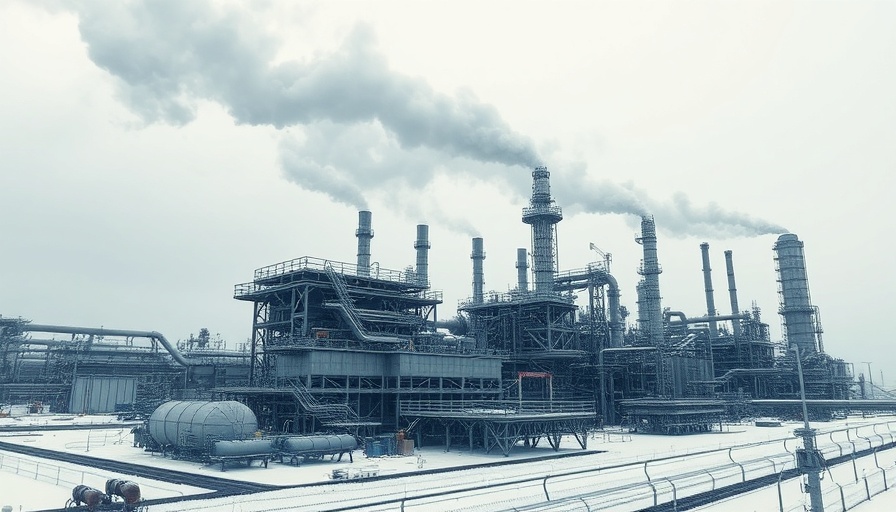
An Energy Crossroads: Alberta's Oil Future
As the geopolitical landscape shifts with increasing tariff threats from the U.S., Alberta's oil sector finds itself at a pivotal crossroads. The warnings from Alberta Premier Danielle Smith highlight a potential shift in strategy for Canada’s largest oil producer, Suncor Energy. With the U.S. accounting for approximately 97% of Canada's oil exports, uncertainty stemming from Donald Trump’s tariffs is prompting a reconsideration of Canada’s energy export strategies.
Two Futures: Cooperation or Diversification?
Premier Smith offered a dual vision of the future at the recent CERAWeek energy conference. One scenario paints a collaborative picture where Canada and the U.S. stabilize their trade relations, creating a 'Fortress North America' that facilitates increased energy flow between the two nations. This would play into Trump’s energy strategy, promoting low consumer prices while shoring up energy independence amid global competition with nations like China.
However, the alternate future presents a more dire outlook where ongoing tariff disputes force Alberta to seek new customers in Asia and Europe. A push towards building additional pipeline capacity to these overseas markets is not just a proactive measure but a necessary pivot in light of trade tensions.
Responding to the Trade War: Strategic Initiatives
In response to tariff pressures, calls for infrastructure expansion are growing louder. The Explorers and Producers Association of Canada emphasizes the need for new pipelines that would enable Alberta to expand its export horizons, ultimately reducing reliance on the U.S. market. Canadian Energy Minister Jonathan Wilkinson echoed this sentiment by suggesting that Canada might impose its own non-tariff measures, including restrictions on oil exports if the trade disputes escalate further.
Moreover, leading figures from the Canadian oil sector are recognizing the urgent need for policy reform to facilitate the development of alternative routes. Enhancing export capabilities will not only stabilize prices but also secure Canada's position as a pivotal player in the global energy markets.
The Rise of Asian Markets: An Opportunity for Canada
With the U.S. turning inward and imposing tariffs, Alberta may find a rich tapestry of opportunity by expanding its market reach to Asia and Europe. Countries like China and India are increasingly hungry for energy resources, and Alberta's vast oil reserves can play a crucial role in meeting this demand. This shift could redefine Alberta’s economic future while providing the necessary buffer against U.S. tariff instability.
A focus on developing trade relations in Asia aligns with the recent trends observed by various industry analysts, who indicate that the Asian market is poised for substantial growth over the coming decades.
Challenges on the Horizon: Domestic and International
However, it's not without its challenges. The existing infrastructure is heavily geared towards delivering oil to the U.S. market. For instance, many refineries across the United States are specifically calibrated to process Alberta's heavy crude, and shifting these operations to accommodate lighter crude might be theoretically plausible but practically burdensome. Alberta's transition will require not only capital but also a concerted effort to address logistical and regulatory hurdles.
Additionally, environmental considerations and local opposition can further complicate the rapid expansion of pipeline networks. Enbridge’s previous attempts to create new pipelines met strong resistance, indicating that the road ahead requires more than just economic strategy; it demands political will and community engagement.
What Lies Ahead: A Critical Period for Alberta's Oil Industry
As Alberta stands on the brink of a strategic pivot, the need for resilient energy strategies has never been more apparent. The ability to navigate tariff pressures while maintaining strong trade ties with both allies and emerging markets will define Alberta’s position in the global energy landscape. The implications of these decisions will be felt across the region, influencing energy prices and economic stability for years to come.
Therefore, stakeholders across Alberta’s oil sector should not only prepare for resistance but also actively engage in dialogue regarding sustainable energy policies that echo the concerns of diverse communities while ensuring economic growth.
Take Action: Engage with Alberta's Energy Future
As Alberta repositions itself in a dynamically changing market, it’s crucial for industry members, policymakers, and consumers to stay informed. Understanding these evolving dynamics will empower informed participation in the pathway toward energy independence and reduces reliance on any single market. Addressing these pressing issues today will shape the future of Alberta’s economic resilience and environmental sustainability. Consider advocating for policies that support infrastructure development and fair trade agreements to strengthen ties globally.
 Add Row
Add Row  Add
Add 



 Add Row
Add Row  Add
Add 
Write A Comment